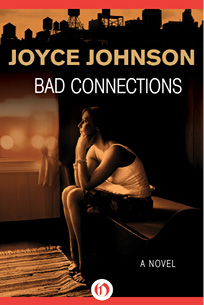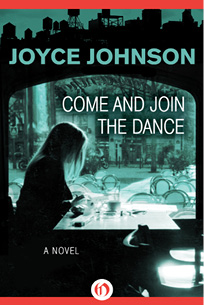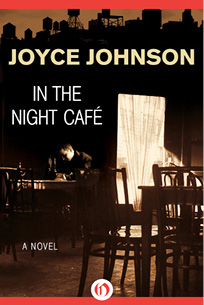In the Night Café (19 page)
Authors: Joyce Johnson

He stopped by Nicky's bed and watched him paint the dragon. He pressed down on it with his thumb. “Hey, the mad monster game!”
“Wet paint, Joseph,” warned Nicky.
Joseph took the dragon right off the bed table. “Joseph, you creep!” Nicky yelled, his eyes filled with tears.
I went over to him and held out my hand. “I'm sorry. Nicky needs his dragon.” It was odd how Joseph inspired politeness.
He stared down at my open palm as if puzzling over its significance. “That wasn't Nick's,” he said.
Joseph stood by the door in the evening when the families came, when the bags of food were opened and the paper plates passed around. I went out to get Nicky a hamburger and a chocolate milkshake. When I came back, the room smelled of fried chicken and everyone was watching “The Odd Couple.” Joseph lay on his bed. He had put his arm over those red eyes, as if the light was hurting him.
Nicky tapped my arm. “Do you see that, Mom? No one came for him.”
I said, “Maybe there's no one to come, Nicky.”
“Someone should.”
I handed him his milkshake. He peeled the paper off the straw and stuck it through the hole in the lid of the container. For a while he twirled it around. “Mom, I think you should get him something. Can you?”
I went down to the machines in the basement and got Joseph an ice cream sandwich. I put it on his dinner tray. I said, “Joseph, this is for you.” His arm stayed where it was. I touched his shoulder. “Do you like ice cream?” I said loudly.
Mrs. Rodriguez, who was sitting at the next bed beside her son Emilio, shook her head at me. “Loco,” she whispered fiercely. “Muy loco. You understand? No good here. No good.”
She wasn't wrong, I couldn't argue. The ice cream sandwich was melting, oozing through its paper wrapping. I went back to Nicky and took him for his walk.
Later, out in the corridor, we saw Joseph. He took a swipe at Nicky's cast as we passed him and yelled after us, “Dragon Man and the Mom!” There was chocolate smeared all over his mouth.
The next day I bought an extra egg roll at the takeout place. It seemed I'd have to keep on with what I'd started, though I had no idea at all how much Joseph remembered. I kept thinking of him lying there alone during visiting hours. What I really wanted was to walk into Room K and find him gone, some other arrangement made, so I could remove him from the list of everything that troubled me.
When I got to the hospital, some of the other parents were there, earlier than usual. They were standing out in the corridor near the head nurse's desk. One of the mothers had her arm around Mrs. Rodriguez, who was wiping her eyes with some Kleenex. They gestured to me to join them. “The supervisor is coming to talk to us about our problem,” someone said.
“What happened?” I asked Mrs. Rodriguez.
She blew her nose; it seemed hard for her to speak. “Joseph! Joseph! Who do you think?”
Joseph had somehow gotten hold of some cigarettes and matches. He had held a lighted match near Emilio's eyes. “To burn my son!” cried Mrs. Rodriguez. Emilio was only eight, a frail little boy with a broken collarbone.
I put down my shopping bag and I waited with the others. When the supervisor came, I spoke up, too. Irresponsibility, negligence, lack of considerationâthe words came so fluently, as if I'd turned into the kind of person I'd always distrusted, someone with very sure opinions about rightness and wrongness and what was best for society.
The supervisor already had his computer working on the situation. “Just give us an hour,” he said.
In Room K, an orderly had been posted to keep an eye on Joseph. He'd made Joseph lie down on his bed. The children were subdued; they talked in murmurs. Even the television was on low, until a parent turned up the volume. There was an effort to create the atmosphere of the usual picnic.
Nicky looked wide-eyed, pale. “Did you hear what Joseph did to Emilio?”
I leaned over him and pushed the wet hair off his forehead. “Nicky, don't worry about Joseph anymore. They're going to move him in a little while to a room by himself.”
I started opening containers from the Chinese takeout place, and there was the egg roll I'd meant to give Joseph. I angled my chair so that I wouldn't have to see him. It was as though life were full of nothing but intolerable choices.
“Eat something,” I said to Nicky.
In a loud, dazed voice, a kid in the room seemed to be talking into a phone. “Hey Grandma, guess who this is? I'm gonna see you soon, you bet. I'm gonna get on a plane and fly. Yeah, I'll bring my little bathing suit. Gonna see you, Grandma. Gonna see you.”
“Mom,” Nicky whispered. “Can you hear him?”
We saw the removal of Joseph; everyone did. Two nurses came in and walked over to him. “Joseph, it's time to get moving now,” one of them said. “Let's get your personal things together.”
They got him off the bed very quickly. One took his suitcase; the other had him by the arm. The orderly positioned himself in front of them. Nicky turned his face into the pillow when they started walking between the rows of beds. I was holding his hand and he kept squeezing my fingers, not letting go.
As he passed by us Joseph broke away from the nurse. For a moment he loomed over Nicky and me. He kissed me on the top of the head. Then they took him out into the long dim corridors.
When Nicky was thirteen, he told me he couldn't remember much about his childhood. He wanted to, but he couldn't. The whole subject made him very angry. “What I remember,” he said, “is Joseph.”
Nicky got well but he got old.
The Night Café
T
HERE ARE LIVES
you could draw in fairly straight, long lines. For others, it's all starts and breaks. Except for Nicky, that's the way it's been for me.
A lot of timeâisn't that what marriage is supposed to come to? So I really never found out about marriage. Not long ago, I came to that conclusion, even though, of course, I married twice. I'll never know what happens when two people spend so many years together, for better or worse, the way my parents did. I wonder if I could have done it, who I would have been by now.
I used to believe Tom and I would have stayed together for lifeâwhich we did, in a sense, although his life was much shorter than mine. He would have stopped drinking, we would have had a child, his kids would have grown up and found their way back to him. I believed everything promised by those last days we had. But maybe nothing was really being overcome. He would have worn me down, driven me away. Time was only going to bring us another kind of ending.
Maybe that afternoon when he was riding home, all of a sudden he knew it. That was what he saw ahead when he rose from the seat of the bike with the back of the truck right there in front of him and his foot pressed down hard on the pedal, as if with the beat of his thought. That was all it took, and he might even have been surprised to have lost control, that the foot had come down like that with so much weight, when he'd only been playing with a very old, familiar idea, when he wasn't even sure he hadn't meant to keep going.
When I was as young as Nicky, living in the first of all my terrible apartments, I remember wanting a little yellow rush-seated chair like Van Gogh's. I kept my eye out for such a chair in stores that sold secondhand furniture. But I could never find one exactly like it.
Tom once told me he couldn't bear to read Van Gogh's letters. I'd read them myself around the time I met him and had found a certain line:
Empty chairs
â
there are many of them, soon there will be more.
Van Gogh was writing about those who had died, or would die. He hadn't painted his own chair yet, the yellow one with his pipe on the seat. He did that after he came out of the madhouse, when I think he must have been seeing with that purity that comes to people after pain. The chair, the real one, was white. Van Gogh wrote his brother merely that he was trying for an effect of light by means of clear color, as if the painting were the humblest exercise. He didn't tell his brother he saw his own death.
After I read the letters, I lost my desire for the little yellow chair, but the painting became more beautiful to me. Maybe I'd been drawn to it in the first place because the darkness was always there, painted into the sunny yellow.
If I were a painter, I wouldn't paint empty chairs. Instead I'd paint windows of places I've left, places where I no longer liveâthe way they look when you see them from the street and you know you can't go up there, can't even cross the threshold. The key is lost. You know someone else is inside there, taking your place. I've looked up from the sidewalk the way Howard Stricker did long ago.
When Nicky was little and we lived on Twelfth Street, Seventh Street wasn't very far. I used to walk by there almost daily, Nicky in his stroller, warm in his padded snowsuit. Somehow I felt protected by having Nicky with me. I'd give myself excuses for taking this routeâI almost believed I was on my way to a better vegetable stand. But when I'd come to the linoleum store, I'd always slow down and look upstairs. I used to see an empty flowerpot on the window ledge, one I was sure I'd left there.
Many of my best photos are of windows. It's an obsession of mine, almost a signature. I especially like the black windows of the old warehouses down by the Hudson, the symmetrical rows that catch fire from the sunsets over New Jersey. I'm always rather fascinated, too, by shop windows that reflect the street outside them, the way the windows of Rappaport's did. I wish I could sit in Rappaport's again on a rainy night with my camera, but of course it's gone out of existence.
It took me eighteen years to go down to Chrystie Street, and I've never walked that block. I saw the windows of our studio just once from a cab. I was on my way to a dinner party in Brooklyn and there was a great deal of traffic on the Bowery. I suddenly told the driver, “Why not take Grand Street?” because I knew he would turn into Chrystie. We went by the building very fast, but I could see the top floors had finally been renovated, though the big windows of the studio looked the same as ever. The front of the place was absolutely dark, but a light was burning all the way in back. I said to myself, Tom's home. And I believed for that moment that he was.
Joyce Johnson was born in 1935 in New York City, the
setting for all her fiction:
Come and Join the Dance
, recognized as the first Beat novel by a
woman writer,
Bad Connections
, and
In the Night Café
. She is best known for her memoir
Minor
Characters
, which won the National Book Critics Circle Award in 1983 and dealt with coming of age in
the 1950s and with her involvement with Jack Kerouac. She has published two other Beat-related
books:
Door Wide Open: A Beat Love Affair in Letters
, and
The Voice Is All: The Lonely Victory of
Jack Kerouac
. She has also written a second memoir,
Missing Men
, and the nonfiction title
What Lisa
Knew: The Truths and Lies of the Steinberg Case
.
All rights reserved, including without limitation the right to reproduce this ebook or any portion thereof in any form or by any means, whether electronic or mechanical, now known or hereinafter invented, without the express written permission of the publisher.
This is a work of fiction. Names, characters, places, events, and incidents either are the product of the author's imagination or are used fictitiously. Any resemblance to actual persons, living or dead, businesses, companies, events, or locales is entirely coincidental.
Portions of the novel originally appeared in
The New Yorker,
in slightly different form as “The Fall of Texas” and “Launching Day, 1962.”
Portions of the novel originally appeared in
Harper's,
in slightly different form as “The Children's Wing.”
Excerpt from “Backwater Blues” by Bessie Smith © 1927, 1974 Frank Music Corp. © Renewed 1955 Frank Music Corp. International Copyright Secured. All Rights Reserved. Used by permission.
Copyright © 1989 by Joyce Johnson
Cover design by Drew Padrutt
ISBN 978-1-4804-8121-3
This edition published in 2014 by Open Road Integrated Media, Inc.
345 Hudson Street
New York, NY 10014
www.openroadmedia.com

FROM OPEN ROAD MEDIA


